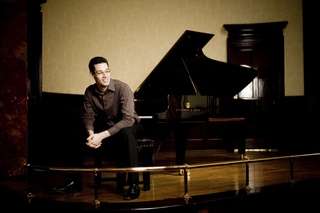|
Back
Pianistic parallels Toronto
Koerner Hall
03/24/2013 - & March 15 (Cedar Rapids), 19 (Calgary), 22 (Boston), May 6 (Lyon), 8 (Luxemburg), 10 (Cambridge), 11 (Oxford), 21 (Cardiff), 22 (London), 26 (Amsterdam), 2013
Robert Schumann: Fantasiestücke, Op. 12 – Davidsbundlertänze, Op. 6
Leos Janácek: Five pieces from Po zarostlém chodnicku
Alban Berg: Sonata, Op. 1
Jonathan Biss (Pianist) 
J. Biss (© The Royal Conservatory)
The opening half of this absorbing recital consisted of the eight pieces of Schumann’s Fantasiestücke interleaved with five pieces from Janácek’s Po zarostlém chodnicku (On the Overgrown Path). What Jonathan Biss has done is paired selected Schumann pieces with “twin” pieces from the Janácek - such as the opening “Des Abends” (“Evening”) alongside “Nase vecery” (“Our evenings”). The Schumann work alternates thoughtful, inward pieces with lively, extroverted pieces; it is usually the more wistful pieces that are paired. Mr. Biss’s fluent performance (solid but not stolid, not show-offish) rewarded careful listening.
It might be argued that the Moravian, folkish side of the Janácek was suppressed to a degree, although certainly not in the “The Madonna of Frydek” piece.
The second part of the program opened with Alban Berg’s Sonata. It’s single movement was intended to be the first of a three-movement piece (thus creating a work in traditional sonata form), but the composer and his teacher, Arnold Schoenberg, concluded that is a standalone complete work. It is a restless work that keeps changing direction - in the context of this recital it seemed suffused with a moody storminess distinctly Schumannesque.
This was followed by the musical journey cum saga of the 18-part Davidsbundlertänze, in which Mr. Biss vividly expressed the contrasting moods between (and sometimes within) each section. His performance was totally convincing right from the first notes of the opening “Lebhaft” (“Lively”) with its quote of a mazurka composed by Clara Wieck, the talented young woman he was not yet permitted to marry. The piece described as “Zart und singend” (“Gentle and songlike”) achieved transcendental liftoff. He sustained a very lengthy silence at the end of the work - and the audience was right with him.
The single encore was a heartfelt performance of a piece from Gesänge der Frühe (Songs of the Dawn), the last work Schumann composed.
The performance was followed by a wonderfully articulate discussion between Jonathan Biss and Royal Conservatory grad student Ryan McCullough. Mr. Biss talked about his current “project” which he calls “Schumann under the influence”, although it seems it could be better titled “Under the influence of Schumann”. His thesis is that the full influence of Schumann on subsequent composers has not been acknowledged, thus his interweaving of the Fantasiestücke pieces with pieces from Janácek’s collection. Similarly, he pointed out that the end of the Berg Sonata is similar to the wistful “Wie aus der ferne”, the penultimate section of Davidsbundlertänze.
This was the ninth performance of this program in a three-week period (although the Berg piece was not on all of them). (His March 12 performance at Zankel Hall, New York City, was reviewed on this website.) He acknowledged the problem of keeping things fresh; to this end he had to resist his normal urge to be a "compulsive practiser" (I’m not sure that’s even a word). The recital was certainly finely honed and well thought out (even the manic bits), but there was no hint of deadening routine.
Michael Johnson
|